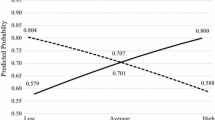Abstract
This paper considers an economic analysis of intergenerational transition of ethnic and social trait. We consider the level of social traits chosen by parents and its effect on their children’s choice of ethnic and social traits when reaching adulthood. We develop a theory that suggests that parents will chose extreme ethnic and social traits to increase the cost that their children will pay if they wish to deviate from their parents’ “ideal.” The extreme choice of the ethnic social traits of parents has an effect on the segregation of minorities and migrants.
Similar content being viewed by others
References
Alesina A, La Ferrara E (2000) Participation in heterogeneous communities. Q J Econ 115(3):847–904
Anas A (2002) Prejudice, exclusion and compensating transfers: the economics of ethnic segregation. J Urban Econ 52(3):409–432
Becker GS (1974) A theory of social interactions. J Polit Econ 84:1063–1094
Bergstrom TC (1989) A fresh look at the Rotten Kid Theorem—and other household mysteries. J Polit Econ 97(5):1138–1159
Bisin A, Verdier T (2000) “Beyond the melting pot”: cultural transmission, marriage, and the evolution of ethnic and religious traits. Q J Econ 115(3):955–988
Bisin A, Verdier T (2001) The economics of culture transmission and the evolution of preferences. J Econ Theory 97:298–319
Card D, DiNardo J, Estes E (2000) The more things change: immigrants and the children of immigrants in the 1940s, the 1970s, and the 1990s. In: Borjas GJ (ed) Issues in the economics of immigration. University of Chicago Press, Chicago, pp. 227–269
Deutsch J, Epstein GS, Lecker T (2006) Multi-generation model of immigrant earnings: theory and application. Res Labor Econ 217–234
Dustmann C, Fabbri F, Preston I (2004) Ethnic concentration, prejudice and racial harassment of minorities. Manuscript, University College, London
Epstein GS, Gang IN (2006) Ethnic networks and international trade. In: Foders F, Langhammer RJ (eds) Labor mobility and the world economy. Springer, Berlin Heidelberg New York, pp 85–103
Erickson JA (1992) Adolescent religious development and commitment: a structural equation model of the role of family, peer group, and educational influences. J Sci Study Relig XXXI:131–152
Glazer A, Gradstein M, Konrad KA (1998) The electoral politics of extreme policies. Econ J 108(451):1677–1685
Gradstein M, Justman M (2005) The melting pot and school choice. J Public Econ 89:871–896
Gradstein M, Schiff M (2006) The political economy of social exclusion, with implications for immigration policy. J Popul Econ 19(2):327–344
Hayes BC, Pittelkow Y (1993) religious beliefs, transmission and the family: an Australian study. J Marriage Fam LV:755–766
Jurges H (2000) Of rotten kids and Rawlsian parents: the optimal timing of intergenerational transfers. J Popul Econ 13:147–157
Lazear EP (1999) Culture and language. J Polit Econ 107(6, pt. 2):S95–S126
Matsusaka JG (1992) Economics of direct legislation. Q J Econ 541–571, May
Acknowledgements
I am grateful to Laura Shuck and two anonymous referees for their constructive and helpful comments. Some of this work was completed while visiting IZA, Bonn, which I thank for its courtesy.
Author information
Authors and Affiliations
Corresponding author
Additional information
Responsible editor: Alessandro Cigno
Rights and permissions
About this article
Cite this article
Epstein, G.S. Extremism within the family. J Popul Econ 20, 707–715 (2007). https://doi.org/10.1007/s00148-006-0100-0
Received:
Accepted:
Published:
Issue Date:
DOI: https://doi.org/10.1007/s00148-006-0100-0




